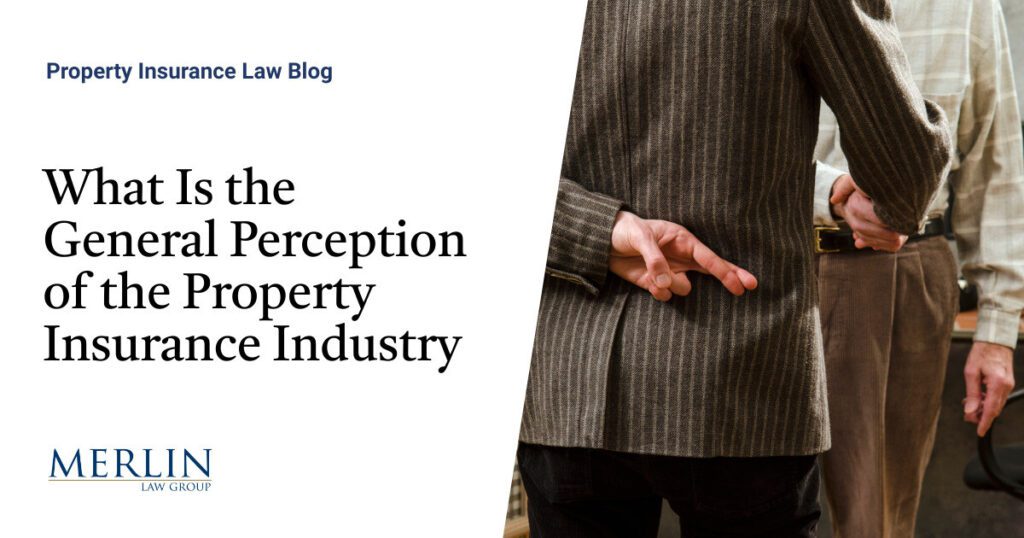What Is the General Perception of the Property Insurance Industry?

There are many very well intentioned, competent, and honorable insurance claims professionals working for property insurance carriers. While reading some of the more than one thousand comments from the article, State Farm Refused To Cover This Florida Man’s Repairs on His Porsche — Why The Courts Are Now Involved, I was wondering what they would think of the story, and especially the comments. What do you think of the general perception of the property insurance industry?
While I did read several hundred of the comments, I certainly do not have time to read them all. So, to answer the question posed in the title, I asked a large language model to read all the comments and provide an answer:
There is a general perception that insurance companies are more focused on profits than serving their customers’ best interests. The sources suggest that many people believe insurance companies will try to deny or underpay claims in order to maximize their profits….The overall tone suggests a general lack of faith and trust in the insurance industry, stemming from perceptions of profit-driven motives.
Most of my survey-wise colleagues will point out that the people making the comments were not an appropriate sample. This is because the article invites those with the problem to read the article. Those with comments are skewed to the “me too” remarks, comments about why this is happening, and other reflections of the negative main article. But I encourage you to take a few minutes and look at the comments because I saw a number of “balanced” remarks still containing the perception that you cannot trust many major insurance companies when it comes to good faith claims treatment.
How do insurance companies typically respond to these allegations of bad faith conduct found in the comments? These are the typical responses:
Deny the allegations outright.
Claim the policyholder has not met the legal burden of proof required of bad faith. Many states still do not recognize an action for bad faith which can be sued upon.
Attempt to settle the bad faith claim to avoid further legal action and potential damages.
Become more adversarial and aggressive. The response is that the policyholder caused the problem or was engaged in fraud.
Bring in new adjusters or supervisors to re-evaluate and seek resolution, if warranted.
Rarely is a public apology given for a wrongful claims practice. Indeed, I cannot think of one.
I am also mindful that people on public forums are often emotionally charged. People in general who wrongly or rightly feel they have been treated unfairly now have a very public voice through comments and social media. Sometimes, these comments are very one-sided.
The view of many carriers is that these emotionally charged comments against insurers simply did not exist because the full story has not been told. I remind people that lawsuits and trials are not perfect historical replications of exactly what happened. The outcomes are based on the evidence presented or allowed and perceptions of that evidence. That can be far from the “rest of the story” truth, where policyholders and insurers may have knowledge of what factually happened.
Tim Ryles wrote an article, Insurance Is “Affected with a Public Interest” arguing that “when the expression ‘utmost good faith’ appears in legal proceedings, adherence to the principle is usually a requirement for the insured, not the insurer.” While I completely disagree with this premise, he claims that “the industry practice of applying the concept to all parties in the relationship sets an industry ethical principle, not a legal standard.” I disagree with that as well because the obligation is certainly legal and with possible consequences if enforced.
The problem for many policyholders and the public in general is the enforcement of the obligation of good faith. My view is that the general perception of the property insurance industry is getting to an all-time low. Most of the folks I speak with and then read comments from are tired of poor claims treatment and what they perceive as unfair premiums by those who have ‘profits over people’ as an unstated mantra. The people are taking to social media and letting their voices be heard because regulations and private causes of action for bad faith are not working as well as they should.
What do I expect the insurance industry, and State Farm in particular, to say in reaction to the above story? What did Marie Antoinette allegedly once say?
Thought For The Day
It is quite certain that in seeing the people who treat us so well despite their own misfortune, we are more obliged than ever to work hard for their happiness. The King seems to understand this truth.
—Marie Antoinette



